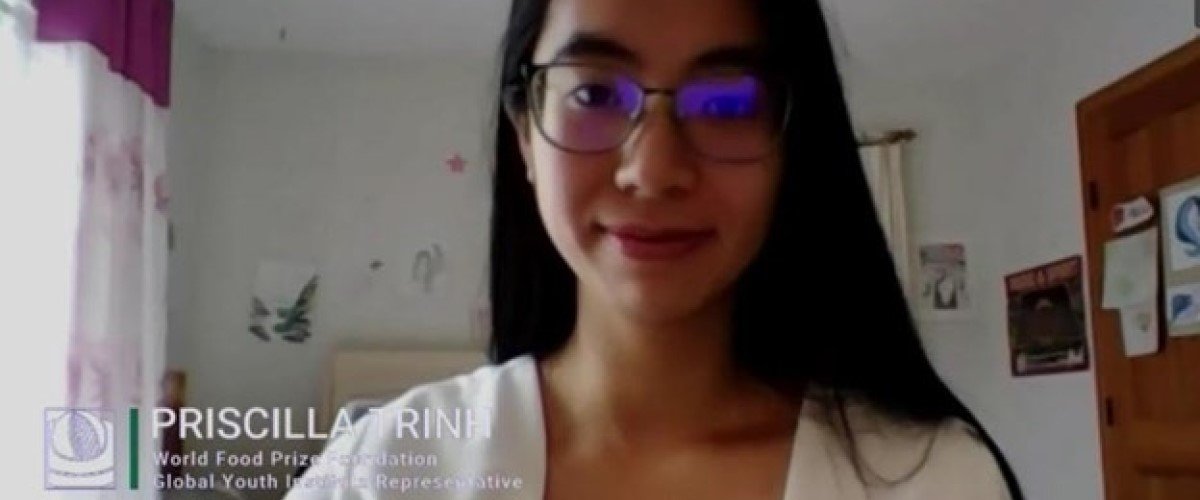
CFANS student shares perspectives at Borlaug Dialogue 2020

Third-year undergraduate CFANS student Priscilla Trịnh joined a panel of distinguished speakers — including the founder of World Central Kitchen, José Andrés, and Special Envoy of the UN Secretary-General, H.E. Agnes Kalibata — for a Borlaug Dialogue 2020 special session at the World Food Prize on October 16, 2020.
Trinh, who is majoring in Sustainable Systems Management with minors in Food Systems and Management, brought unique perspectives to the panel, titled “The Road to the 2021 Food Systems Summit.” Previously, she was a participant in the 2018 Global Youth Institute and a 2019 International Intern at IRRI in the Philippines. Currently, Trinh is a co-coordinator of the Minnesota Youth Institute (MNYI), which engages high school students in solving local and global hunger issues.
Here, Trinh shares some insights from her Borlaug Dialogue experience.
Q: Why do you feel it is important for MNYI to represent and share the perspectives of young people in the crucial conversations happening at The World Food Prize?
This year’s Borlaug Dialogue theme was “Breaking New Ground: Building Resilience Today for Improved Global Food Systems Tomorrow.” To truly build resilience, it is crucial to hold multigenerational conversations. I often see a generational rift between boomers and millennials, and now us, Gen-Z. Not only is this unproductive, it is also riddled with misunderstanding. I believe youth representation is important to alter perceptions adults have of the youth, and youth of adults. Youth presence is also needed to advocate for ideas that may seem too “radical” but are valid and worth consideration. Personally, I am disillusioned with green growth and wanted to pose that thought in an arena that is historically pro-Green Revolution.
This year, 214 high school students and 55 college students across 11 countries gathered at this event to fight hunger. They were selected from over 10,000 young leaders across 17 countries who engaged in World Food Prize youth programs and hunger-fighting activities in their schools and communities.
Q: What did you enjoy most about participating in “The Road to the 2021 Food Summit” special session?
At the special session, a wide variety of stakeholders were present, including UN committee members, a corn farmer, an entrepreneur, a chef, agribusiness, and finally, me. This is the third time I’ve participated in World Food Prize programs, and every time I am reminded that despite our differences in praxis, everyone has the same goal: improving global food security. I enjoyed hearing about the UN’s plans to conduct multilayered stakeholder engagement projects in preparation for the 2021 Food Summit. I find the bottom-up approach promising as it humanizes big institutions like the UN and other initiatives that may seem bureaucratic.
Also, as part of the panel I announced a new initiative being launched this year in preparation for the 2021 UN Food Systems Summit by the World Food Prize Foundation. During this year’s Global Youth Institute, students’ research ideas and language will be gathered and compiled into a whitepaper. The whitepaper will be submitted to the UN as a conduit representing youth voices and a way for youth to directly engage in shaping global food systems.
Q: What were some of the topics your group of speakers discussed?
An emphasized sentiment was: we can agree to disagree. In trying to unite multiple stakeholders, the speakers understood that consensus is not needed to move forward. We have more than enough information to know what must be done to improve global food systems. The Summit is not a negotiation meeting — it is a space to start doing. In addition, understanding that science is unfortunately a political subject, the UN for the first time has assembled a Scientific Group as part of their task force and anticipates science to be the driving force behind actions adopted at the local, national and international level.
Q: What is the most important thing you learned at the session?
Professor Louise Fresco stated that there is not one, ten, or a hundred food systems — there are thousands of food systems to consider, and subsequently, thousands of approaches to take. There is no one-size-fits-all solution and while that sentiment seems like a truism, it is an important reminder that united efforts do not negate the need for decentralized, contextualized solutions.
Q: What advice do you have for people of all ages to take action in the critical area of building resilience today for improved global food systems tomorrow?
I would first advise people to recognize the simultaneous temporal and eternal existence of life. Temporal because as a species subject to ecology, we are bound by the laws of energy and natural rise and decline of growth — nothing can expand forever. Eternal because there will be those succeeding us, and our decisions today will have ripples into the future. Cherishing our finite time on earth entails an intimate relationship with the broader web of life. I encourage people to first recognize the neocolonial context in which we live, divorced from the land and robbed of agency to nourish our own bodies.
Then, start growing stuff and your mind! Farming can start with window-sill horticulture or watching a YouTube video: one doesn’t need much land or resources to understand plants or our living relatives. Try unplugging from things that might be resource intensive. Instead of refrigeration, what if we used Zeer pots? Rather than taking that plastic spoon, what if you invested in a wooden set to clip to your backpack? Reviewing what we need or don’t need is critical knowing our world is only able to function thanks to cheap fossil energy. Moving towards zero waste is a must.





